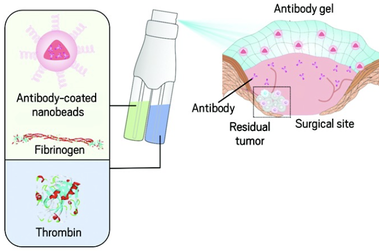|
By: Sarah Wornow Edited by: Alyscia Batista Undergoing a surgical operation to remove a tumor may be the only way to save a cancer patient’s life. Yet even with a potentially life-saving operation, cancer cells left in the body post-surgery can begin to grow again and lead to cancer recurrence. Cancer recurrence isn’t uncommon — for example, pancreatic cancer has a 40% chance of recurring after surgery, bladder cancer has a 50% chance of recurring post-surgery, and advanced soft tissue sarcoma has a nearly 100% chance of recurrence [1]. Even though surgically removing the tumor may appear to be beneficial in cutting cancer out of the body, it can actually “increase [the] shedding of cancer cells into circulation,” thereby promoting the growth and spread of cancerous cells throughout a patient’s body [2]. In the end, surgery can actually be counterproductive to treating cancer. Recently, researchers at UCLA have developed a sprayable gel for surgeons to use after removing a tumor that boosts the immune response to any remaining cancerous cells left in the area. Cancer cells usually overproduce CD47, a protein that sends “don’t eat me” signals to phagocytic cells, which essentially makes them invisible to immune cells and allows them to grow without being killed [3]. The gel– which consists of the blood clotting proteins thrombin and fibrinogen, along with CaCO3 nanoparticles laden with antibodies– slowly releases anti-CD47 antibodies at the site of the tumor. These antibodies block CD47 from sending out their signal, allowing the cancerous cells to become visible to the immune system. Macrophages and other phagocytic cells can then respond to the cancer cells and kill them. In addition to bolstering the innate immune response, the adaptive immune response becomes stronger due to the macrophages presenting tumor-specific antigens to T-cells [4]. The adaptive immune system can then fully destroy the cells. In a clinical setting, this gel could potentially have a huge impact on decreasing the chance of cancer recurrence. Researchers found that mice who underwent surgery for advanced melanoma and were sprayed with the gel remained tumor-free for over 60 days. Not only can the gel prevent tumor recurrence in the same site, but studies in mouse models have shown that it also can prevent distant tumor spread, decreasing the chance of cancer forming in another area of the body, a process known as metastasis [5]. Another benefit to using this gel is that patients wouldn’t have to undergo additional chemotherapy, immunotherapy, or radiation treatments post-surgery to kill any remaining cancer cells. All of these treatments cause unwanted side effects to the patient such as hair loss, nausea, or illness. Despite these incredible discoveries, there’s still a long way to go before the gel can be used in humans. The researchers have to optimize the concentrations of anti-CD47 antibodies, fibrinogen, and CaCO3 nanoparticles to more effectively boost the immune response. Future testing could take years to complete. Nevertheless, this preliminary gel has proven to be effective at reducing the chance of post-surgical cancer recurrence. Cancer surgeries could now potentially be a one-and-done deal, with one surgery having the ability to completely remove all cancerous cells. Finding a way to make surgery more effective will impact the majority of cancer patients, as most cancers typically require surgery as part of the treatment. There are a few reasons why this gel could become standard practice for surgeons to use in the future. First, it’s fairly simple to produce, with the main three ingredients being fibrinogen, thrombin, and CaCO3 nanoparticles. All of these molecules can be created in a lab and tweaked to obtain the right concentration. Secondly, the gel can be used for most types of cancers. Because most cancer cells overexpress CD47 to hide themselves from the immune system, having a general anti-CD47 antibody can effectively make those cells visible to the immune system and able to be phagocytosed. Lastly, it causes no extra harm to the patient. As opposed to chemotherapy or radiation therapy, which both negatively impact a patient’s body, this gel seemingly has no side effects on the patient, as shown by mouse models. While there’s still a long way to go before seeing this gel being used in clinical trials, with the advent of this gel comes the hope that one day cancer patients won’t have to fear cancer recurrence after surgery.  Image from the American Chemical Society Citations:
[1] Primeau AP. Cancer Recurrence Statistics. [Internet] [Cited 2019 Oct 4]. Available from: https://www.cancertherapyadvisor.com/home/tools/fact-sheets/cancer-recurrence-statistics/ [2] Tohme S, Simmons R, Tsung A. Surgery for Cancer: A Trigger for Metastases. American Association for Cancer Research [Internet]; 2017 Mar 22. Available from: https://www.ncbi.nlm.nih.gov/pmc/articles/PMC5380551/ [3] Stanford Institute for Stem Cell Biology and Regenerative Medicine. CD47 [Internet] [Cited 2019 Oct 5]. Available from: https://med.stanford.edu/stemcell/CD47.html. [4] Chen Q, Wang C, Zhang X, Chen G, Hu Q, Li H, et. al. In situ sprayed bioresponsive immunotherapeutic gel for post-surgical cancer treatment. Nature Nanotechnology [Internet]. 2018 [Cited 5 Oct 2019]; volume (14), 89-97. DOI: s41565-018-0319-4 [5] Paddock C. Spray gel could reduce cancer spread after surgery. [Internet] [Cited 2019 Oct 5]. Available from: https://www.medicalnewstoday.com/articles/324009.php
0 Comments
Leave a Reply. |
